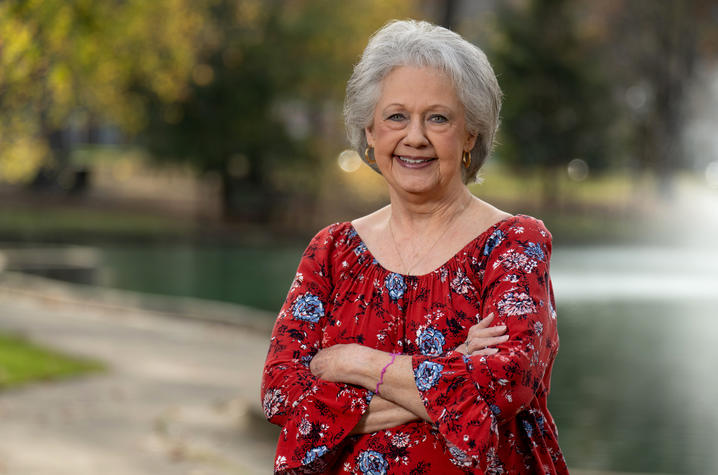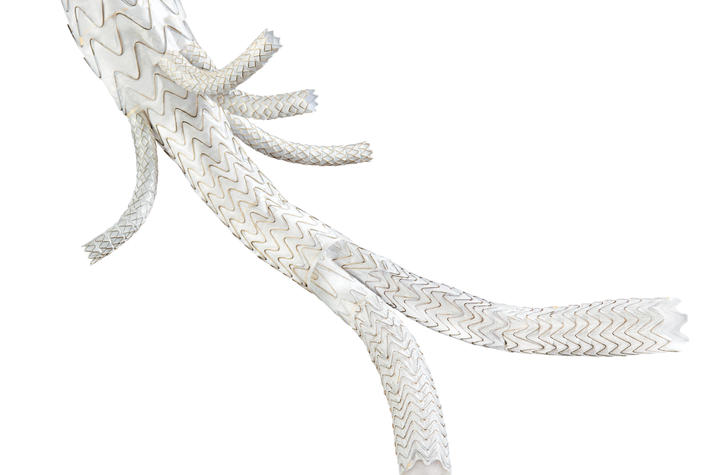Gill surgeons 1st in Kentucky to offer less invasive treatment for aortic aneurysm
LEXINGTON, Ky. (Nov. 18, 2024) — Riding in the back of an ambulance flying down Interstate 64, Bonnie Hutton wondered what would happen next.
After a day of nausea and illness, Hutton went to her local emergency room at UK King’s Daughters in Ashland, Kentucky. X-rays, blood work and other tests revealed she had a bowel blockage. Plus, the 75-year-old from nearby Raceland knew she had an aortic aneurysm — a complex and worsening bulge in her aorta, the largest blood vessel in the body — that could lead to the loss of a kidney or be potentially fatal.
On May 31, Hutton loaded up in the back of an ambulance bound for Lexington and the University of Kentucky’s Albert B. Chandler Hospital.
“At that time, I wasn’t sure what they were going to be able to do,” Hutton said. “I was wondering how the bowel blockage was affecting the aneurysm. It was getting more and more complicated.”
She didn’t know she’d be making history.
What is an aortic aneurysm?
The aorta is vital to keep the body functioning. The blood vessel begins at the heart and runs from the chest down through the abdomen, supplying many organs with nutrients and oxygen-rich blood.
Weakness in the wall of the aorta can cause a section to balloon into a bulge called an aortic aneurysm. Aneurysms can burst — potentially leading to life-threatening internal bleeding.
Hutton had known about her aneurysm for some time. Omran Abul-Khoudoud, M.D., a vascular surgeon at UK King’s Daughters, had been monitoring the aneurysm — which was impacting the blood vessels to her kidneys and bowels — for close to five years, performing regular CT scans to check its growth. But with the bowel blockage complicating matters and the aneurysm growing larger, the decision was made to refer Hutton to UK HealthCare.
“We had discussed with her before that, when the time comes, we’ll need to send her to Lexington,” Abul-Khoudoud said. “She had a very high surgical risk and she needed a team that was experienced in minimally invasive, endovascular repair of these aneurysms. The UK HealthCare team has great experience in repairing those.”
Two years ago, King’s Daughters officially became part of the UK family. The regional hospital is also a member of the UK Gill Heart & Vascular Institute Affiliate Network, which works closely with 25 hospitals across Kentucky to help ensure patients receive effective, high-quality cardiovascular treatment. That can be done by offering community hospitals specialized training in the latest in cardiovascular medicine, assisting through telemedicine or transferring patients in need of specialized critical care to UK HealthCare in Lexington.
“We’ve been collaborating with the UK vascular team for a long time,” Abul-Khoudoud said. “They have a great team and we have a lot contact with them. We have all the surgeons’ cell phone numbers and it’s extremely helpful.”
First in Kentucky
Once Hutton made it to Lexington, she came under the care of Sam Tyagi, M.D., a vascular surgeon at UK HealthCare who is also among the first in the country to be trained on performing an innovative, less invasive surgery to fix aortic aneurysms.
The standard way to treat an aortic aneurysm requires opening the patient’s chest and abdomen — a high-risk procedure with an in-operation mortality rate of 10%, Tyagi said. Instead, Tyagi has the training and experience to implant a GORE EXCLUDER Thoracoabdominal Branch Endoprosthesis (TAMBE) device.
“Not every patient is an open operative candidate, so the TAMBE device takes a lot of patients who have no option and gives them a minimally invasive one,” Tyagi said. “The mortality rate in the clinical trial for this device was zero.”
The GORE TAMBE is a small, white device with branches that can be deployed within the aorta without opening up the chest. The device was approved by the U.S. Food and Drug Administration in early 2024, making it the first and currently only such device to have FDA approval. Only a select few surgeons across the country, including Tyagi, have the training to implant the device.
“It’s a very complex device to implant that very few people can do and are going to do,” Tyagi said.
On June 13, Hutton became the first patient in Kentucky to receive a GORE TAMBE device. Since then, Tyagi said they’ve already been able to complete four such surgeries with several more already scheduled.
“It looks like a little lizard,” Hutton said of the device with a laugh. “I was surprised, and I was happy for Dr. Tyagi and for the university to be able to get those TAMBE devices when they did.”
The power of a network
That surgery paved the way for Hutton to have a hernia and bowel obstruction repaired through surgery in September.
“That’s what we can do at UK,” Tyagi said. “We can take a patient with multiple complex, life-threatening conditions and have a way of approaching each problem to really reduce the risk for each individual component to help her get through it.”
Leveraging the power of the Gill Heart & Vascular Institute Affiliate Network also allows UK HealthCare providers in Lexington to partner with local physicians who can help continue high quality care well after a complex surgery.
“We have a good relationship with her vascular surgeon that’s more local,” Tyagi said. “We can work together with them so that once the big problems are taken care of here, she can return home and get great follow-up care there.”
Hutton continued to recover from her surgeries and in October was able to enjoy dinner with her great-grandson at Greenbo Lake State Park.
Owners of a 19-foot boat, Hutton and her husband are also big fishing fans. After her surgeries, Hutton is looking forward to spending more time with grandson and more time on the water.
“The day I went to the hospital was supposed to be the day we went to Dale Hollow Lake to go fishing,” Hutton said. “We’ve already got a vacation scheduled for next June at that same lake. As long as we’re able, we’re going to still take our boat out and go fishing.”
UK HealthCare is the hospitals and clinics of the University of Kentucky. But it is so much more. It is more than 10,000 dedicated health care professionals committed to providing advanced subspecialty care for the most critically injured and ill patients from the Commonwealth and beyond. It also is the home of the state’s only National Cancer Institute (NCI)-designated Comprehensive Cancer Center, a Level IV Neonatal Intensive Care Unit that cares for the tiniest and sickest newborns and the region’s only Level 1 trauma center.
As an academic research institution, we are continuously pursuing the next generation of cures, treatments, protocols and policies. Our discoveries have the potential to change what’s medically possible within our lifetimes. Our educators and thought leaders are transforming the health care landscape as our six health professions colleges teach the next generation of doctors, nurses, pharmacists and other health care professionals, spreading the highest standards of care. UK HealthCare is the power of advanced medicine committed to creating a healthier Kentucky, now and for generations to come.






